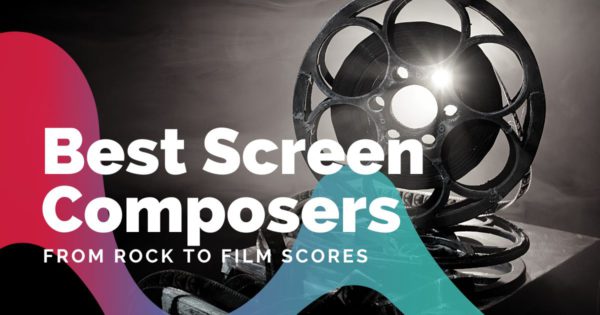
14 Nov 5 Superstar Artists Who Became Screen Composers
So you’ve been a star, lived the rock ’n’ roll dream with all the trappings, recorded hit songs that are now part of the popular music canon, and played concerts to tens of thousands in all corners of the globe. So now what? How else to share your musical chops in a creative way?
For many in this position, one of the obvious answers is writing music for the screen. Below we’ve picked just five (from a long list!) who’ve successfully transitioned from rock stardom to becoming screen composers.
Stewart Copeland
Revered as one of the greatest pop/ rock drummers of all time, in The Police, Copeland was the intricate backbone to the jazz guitar voicings of Andy Summers and the masterful genre-straddling songs of Gordon Sumner, aka Sting. Not only did he hold down the beat, he was an unignorable component of what set them apart. Clearly he could do more than thump the tubs, and so it was that post Police, Hollywood came calling. Wall Street, Rumblefish, and Talk Radio being some of the hits. Not content with movies alone, he’s also written for TV – The Equaliser, Babylon 5 – and games, including the Playstation hit, Spyro The Dragon.
Trent Reznor
From such easy listening classics as Head Like A Hole and March Of The Pigs, Nine Inch Nails frontman Trent Reznor, showed a new way to do angry music – it wasn’t punk, it wasn’t rap and it wasn’t metal. A pianist by training, he discovered synthesizers & computers, and onto these welded razor-sharp guitars and searing vocals. Equipped as he was to create musical soundscapes – largely by himself – the move to cinema was seamless. Although he has contributed work to movies like David Lynch’s Lost Highway and Oliver Stone’s Natural Born Killers, the bulk of his screen compositions have been in David Fincher movies including The Social Network and The Girl With The Dragon Tattoo. Other notable credits include the documentary Before The Flood, the TV series The Watchmen and the Oscar-winning, Soul; all with collaborator Atticus Ross.
Wendy Melvoin & Lisa Coleman
Riding shotgun to one of the biggest music stars of all time – Prince – Wendy & Lisa were key to the success of a musical genius. How key? Well just listen to the opening chords of Purple Rain as 19-year-old Melvoin melts your heart into a purple puddle. Those peerless skills were perfect for a transition to screen composing, and the duo have enjoyed continued success for decades. From Dangerous Minds to Nurse Jackie, Heroes, Crossing Jordan and the award-winning Something New.
Jonny Greenwood
Stage left at a Radiohead concert you’ll see the brothers Greenwood, with multi-instrumentalist Johnny not so much playing as weaving sounds from an array of guitars, keyboards and what looks like soviet era guitar pedals. Starting his screen composing with a bang, he received a Critics Choice awards for his amazing work on Paul Thomas Anderson’s, There Will Be Blood. Another Anderson film – Phantom Thread – earned him an Oscar nomination as did his most recent cinematic masterpiece, The Power Of The Dog.
Clint Mansell
After a successful career in the 90s as lead singer and multi-instrumentalist for the genre-bending band, Pop Will Eat Itself, Clint Mansell could easily have faded away into alternative music history. Instead, he answered a call from Darren Aronofsky and went 2 from 2, scoring the modern-day cult classics Pi and Requiem for A Dream. And from that auspicious first foray, it’s been a steady stream of credits for film, television and games. Notable mentions include Black Swan, The Wrestler, Doom Patrol and CSI: Miami.
Want to learn more about amazing scores written by screen composers? Check out our blog post, “Top 5 Most Iconic Film Soundtracks.”


